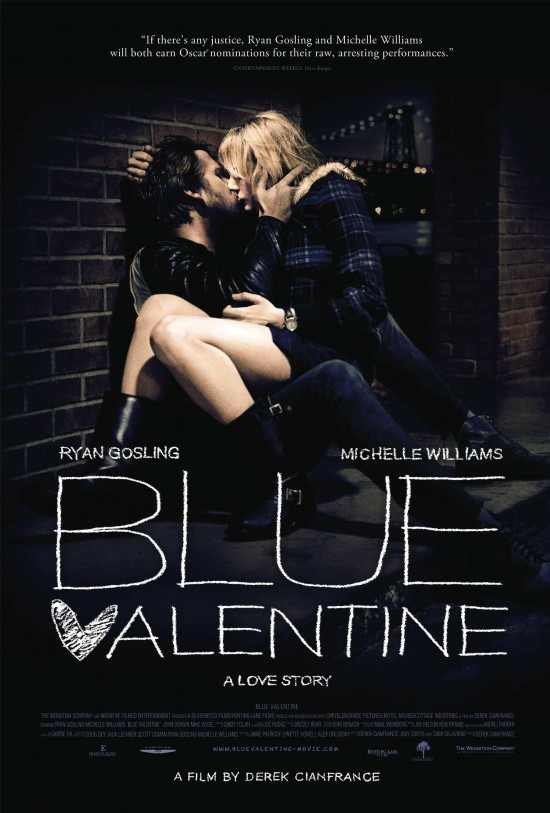
BLUE VALENTINE (2010, Dir. by Derek Cianfrance, 112 minutes, U.S.)
If you’re expecting a warm-fuzzy remake of The Notebook, where romance-never-dies and love conquers all, think again. With Ryan Gosling assuming as the lead, along with Heath Ledger ex- Michelle Williams, it’s no wonder that such preconceptions arise, but, as the title suggests, this isn’t going to be all sunshine and lollipops. On the other hand, if you’ve come looking for a brutally realistic examination of love-on-the-rocks married life, accompanied by a reversal of typical gender stereotypes, then this is a film for you. From the get-go, the camera delves intimately into the lives of Dean and Cindy (Gosling and Williams), a troubled couple whose dysfunctional marriage is further stressed by Cindy’s frustration with Dean’s inability to better himself and “live the dream.” Instead he settles for a job painting houses and drinking beer. Gosling surpasses expectation with a performance that is both moving and disturbingly real and while Williams is less affecting, her chemistry with Gosling is undeniable and together they create a devastatingly vivid portrait of a marriage unraveling. Cindy’s dissatisfaction is by no means surprising considering the examples set by her elders and Williams does well with expressing her character’s struggle to determine her own views. The opening scene dives straight into the present day with the couple’s child alone and searching for their missing dog amidst a silent landscape that paves the way for much of the intriguing ambiguity that hangs over the film like a low-lying cloud. Much of the story is told in haunting and poetic flashbacks as the film seamlessly transitions between past and present. The flashbacks tie the film together with precision whilst paralleling Dean’s own inability to transition as a human being. Director Derek Cianfrance does a fantastic job of providing the audience with just enough dialogue and character interaction to create deliberate tension, yet moments of pure hilarity provide the occasional respite only to dissolve as quickly as they arrived and remind us of the couple’s unsatisfactory reality. It is also particularly refreshing to see that Cianfrance is unafraid of utilizing silence as a means of expression. All those long, lingering close-up shots of Gosling and Williams interacting wordlessly forces us to become voyeurs with a front row seat for the unfolding scenes of attraction and repulsion. It is hard to feel optimistic about love and the place of both a man and a woman within marriage after seeing Blue Valentine, but this seems to be the point. Cianfrance is not necessarily cynical in his own perspective, but he makes us question the status quo, and rightly so.Whilst it is maddeningly ambiguous and terribly disheartening in parts, the film never blinks in the face of Cianfrance’s brave intentions to keep it unflinchingly real. — LAURA WESTERMAN
